|
|
|
Sort Order |
|
|
|
Items / Page
|
|
|
|
|
|
|
| Srl | Item |
| 1 |
ID:
089370
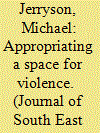

|
|
|
|
|
| Publication |
2009.
|
| Summary/Abstract |
In southern Thailand, monasteries once served as focal points for different communal identities to negotiate shared space and, with it, shared identities. However, since martial law was declared in 2004, Muslims in southern Thailand do not frequent monasteries. Instead, soldiers and police occupy monastery buildings and protect the perimeters from attacks. In addition, there are now military monks, soldiers who are simultaneously ordained monks, who work to protect the monasteries. This article argues that the Thai State's militarisation of monasteries and the role of Buddhist monks fuel a religious dimension to the ongoing civil war in southern Thailand.
|
|
|
|
|
|
|
|
|
|
|
|
|
|
|
|
| 2 |
ID:
096570
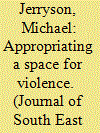

|
|
|
|
|
| Publication |
2009.
|
| Summary/Abstract |
In southern Thailand, monasteries once served as focal points for different communal identities to negotiate shared space and, with it, shared identities. However, since martial law was declared in 2004, Muslims in southern Thailand do not frequent monasteries. Instead, soldiers and police occupy monastery buildings and protect the perimeters from attacks. In addition, there are now military monks, soldiers who are simultaneously ordained monks, who work to protect the monasteries. This article argues that the Thai State's militarisation of monasteries and the role of Buddhist monks fuel a religious dimension to the ongoing civil war in southern Thailand.
|
|
|
|
|
|
|
|
|
|
|
|
|
|
|
|
| 3 |
ID:
098456
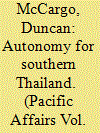

|
|
|
|
|
| Publication |
2010.
|
| Summary/Abstract |
Over 4000 people have died since 2004 in a violent conflict affecting Thailand's Malay-majority southern border provinces, Pattani, Yala, Narathiwat, and four districts of neighbouring Songkhla. Offering some form of autonomy or substantive decentralization to this troubled region might seem like an obvious response to the violence, but the topic has remained largely taboo until recently. Autonomy is seen by Bangkok in essentially pre-Cold War terms, as the thin end of the wedge, which could prefigure an unravelling of the unitary state crafted during the time of King Chulalongkorn. Nevertheless, in recent years a number of senior figures from different positions in Thai society have voiced support for alternative governance arrangements for the deep South. These have included Dr Prawase Wasi, one of the architects of the 1997 constitution, former prime minister Chavalit Yongchaiyudh, former interior minister Chalerm Yubamrung, and a number of academics. Their proposals range from full autonomy for the deep South to a national project of regionalization, as well as the creation of a new ministry to oversee the area. Prime Minister Abhisit Vejjajiva has offered mixed messages on the subject but has indicated sympathy for some form of decentralization. This article argues that despite the controversial nature of such proposals, there is a slowly emerging consensus around the need for a political solution to the conflict. In other words, Thailand is moving towards a post-Cold War understanding of autonomy as a means of preserving rather than undermining the nation state.
|
|
|
|
|
|
|
|
|
|
|
|
|
|
|
|
| 4 |
ID:
097797
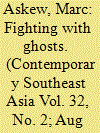

|
|
|
| 5 |
ID:
129244
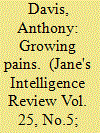

|
|
|
| 6 |
ID:
087455
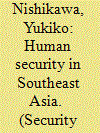

|
|
|
|
|
| Publication |
2009.
|
| Summary/Abstract |
This article explores the concept of human security and its relevance to the discourse and management of security in Southeast Asia. It examines whether the human security concept is applicable in the management of internal conflicts in that region, such as the conflict currently taking place in southern Thailand. The article argues that human security will have limited applicability in dealing with internal conflicts in Southeast Asia because of the huge gaps between what governments and other groups within Southeast Asian societies regard as threats. Nevertheless, the concept contributes to our understanding of the complex root causes of violence and illustrates links between human insecurity and conflict. The article concludes that the future usefulness of human security in efforts to manage internal conflict in Southeast Asia will depend on whether the analysis of specific situations incorporates a thorough understanding of the unique relationships between government and other groups, as manifested in the `ASEAN Way', within the localities in question.
|
|
|
|
|
|
|
|
|
|
|
|
|
|
|
|
| 7 |
ID:
101016
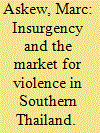

|
|
|
|
|
| Publication |
2010.
|
| Summary/Abstract |
Although violence in Thailand's southern border provinces declined from its peak in 2007, low-level violence continues to challenge the state. This essay discusses the limitations of paradigms and policy under the current Democrat Party-led government in the context of the enigmatic insurgency and associated opportunistic violence fuelling the instability.
|
|
|
|
|
|
|
|
|
|
|
|
|
|
|
|
| 8 |
ID:
183455


|
|
|
|
|
| Summary/Abstract |
The Westphalian system provides the global context of international relations within which the recent and contemporary ‘small wars and insurgencies’ of Maritime Southeast Asia have developed. Usually dated to the Peace of Westphalia in 1648, ending the Thirty Years’ War in Europe, the Westphalian system located sovereignty in states, following the principle of cuius regio, eius religio (whose realm, their religion). This system replaced arrangements where sovereignty was more mixed, leading at times to conflict over the location of authority.
|
|
|
|
|
|
|
|
|
|
|
|
|
|
|
|
| 9 |
ID:
152535
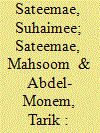

|
|
|
|
|
| Summary/Abstract |
Recent research on Muslim populations has offered interesting but limited insights about values preferences. This mixed-methods study examines the prevalence of support for patriarchy among a sample of religious Muslim university students in Southern Thailand using items from the World Values Survey. It also investigates the durability of these preferences by examining correlations between support or opposition to patriarchal values with preferences towards courtship practices, and elements that influence respondents’ views on gender roles, particularly related to the contemporary socio-economic and political situation facing the Muslim minority of Southern Thailand.
|
|
|
|
|
|
|
|
|
|
|
|
|
|
|
|
| 10 |
ID:
183459
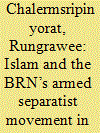

|
|
|
|
|
| Summary/Abstract |
This article examines the roles of religion in the contemporary separatist movement in southern Thailand, whose violent campaigns have dramatically surged since 2004. It locates Islam in the region’s own political and historical context rather than viewing it as an expression of transnational terrorism or casting Islam as of secondary importance in what is seen as primarily an ethno-nationalist struggle, as some scholars have done. I argue that Islam served as a powerful motivational frame that drove thousands of Malay Muslims to take part in the violent struggle led by the Patani Malay National Revolutionary Front (BRN), as a sacred justification for their violent actions and as a blueprint of a new socio-political order. The conflict was elevated into a cosmological battle and the fighters’ actions were fundamentally framed within Islamic theology. Islamic law was employed as a primary reference for the justification and regulation of violent attacks. This article also demonstrates that Islam is part of the BRN’s political agenda and fighters have turned their perceived Islamic beliefs and norms into military actions. However, its ideological orientation is at variance with that of the transnational jihadists. This article offers a more nuanced approach to understanding the religious dimensions of this conflict.
|
|
|
|
|
|
|
|
|
|
|
|
|
|
|
|
| 11 |
ID:
097801
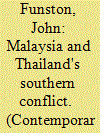

|
|
|
| 12 |
ID:
160258
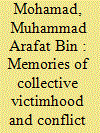

|
|
|
|
|
| Summary/Abstract |
This article discusses the views and attitudes of the Malay-speaking Muslims of Thailand's Far South (henceforth, simply the Malays) about their collective position in Thai politics. Since 2004, the Far South, comprising the provinces of Narathiwat, Pattani, and Yala, has been engulfed in political violence that has claimed several thousand lives. Consequently, the conflict is often the subject of conversations among the Malays. More importantly, the Malays sometimes evoke their collective memory of episodes of past violence involving members of the Far South Malay society and the Thai state in their discussions about contemporary incidents. Why do the Malays hark back to the past when they discuss contemporary political violence? What connections do the Malays make between past and contemporary events? In this article, I discuss Malay collective memory about the Pattani Demonstration of 1975 and the Tomb of Martyrs at the Tok Ayoh Cemetery in Pattani province. I argue that, among the Malays, historic graves in Thailand's Far South are commemorative objects that aid the circulation of stories about collective victimhood pertaining to events such as the Pattani Demonstration. Such stories are central to the maintenance of a shared sense of community among the Malays vis-à-vis the rest of Thai society.
|
|
|
|
|
|
|
|
|
|
|
|
|
|
|
|
| 13 |
ID:
084356
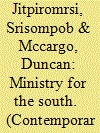

|
|
|
| 14 |
ID:
094421
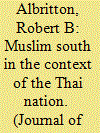

|
|
|
|
|
| Publication |
2010.
|
| Summary/Abstract |
The years since 2004 have been marked by a level of insurgency in the southern region of Thailand unknown for decades. An accurate perspective on this conflict requires a deeper understanding of differences between the Buddhist and Muslim Thais of the region than has been evident in public and academic discourse. This study utilizes data from a survey taken in 2006, of attitudes and political orientations across all regions of Thailand, including an independent sample of the southern region. The data indicate that southerners are different from the rest of Thailand, whether Buddhist or Muslim; that Malay-speaking Muslims are different from other Muslims; and that sympathy for the insurgency lies not in religion, but in defending practices associated with loyalty to specific forms of Malay culture that characterize the region.
|
|
|
|
|
|
|
|
|
|
|
|
|
|
|
|
| 15 |
ID:
111562
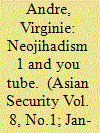

|
|
|
|
|
| Publication |
2012.
|
| Summary/Abstract |
This article examines the use of YouTube by the new generation of Patani 2
Muslim militants in their dissemination of propaganda and radical identity formation. These fighters have now brought their neojihadist war to the 'Virtual'. Videos of Patani shuhada and Buddhist beheadings are regularly posted on YouTube, with the aim of legitimizing their 'defensive jihad'. While most of the efforts in countering virtual terrorist radicalization have focused on jihadist websites, forums and blogs, very little attention has been paid to the relationship between the 'YouTube effect' and neojihadist violence. This article offers an analysis of the use of YouTube by the Patani Muslim insurgency in order to extract the ideological themes which enable us to understand the process of glocal neojihadist radicalization in southern Thailand.
|
|
|
|
|
|
|
|
|
|
|
|
|
|
|
|
| 16 |
ID:
180643
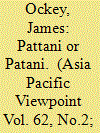

|
|
|
|
|
| Summary/Abstract |
The conflict in Southern Thailand has claimed over 7000 lives in the last 15 years, with no end it sight. The Thai state has consistently misinterpreted both the causes and the solutions to the problems. This article seeks to identify one cause for the conflict, through examining identity in the south through the lenses of collective memory and forgetting. By focusing on young activists at university, it demonstrates the ways that collective memory is generated through shared pilgrimages to sacred places, and shared activities in the pursuit of peace. It also explores the ways that shared memory is both created through debate, through sharing and even through hate speech on the internet, and discusses the ways that social media debates deepen collective memory in oppositional and dangerous ways. Finally, the article argues that until a place is found for local collective memories of Patani in the Thai national collective memory, long-term peace will be impossible.
|
|
|
|
|
|
|
|
|
|
|
|
|
|
|
|
| 17 |
ID:
173738
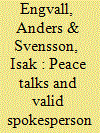

|
|
|
|
|
| Summary/Abstract |
There have been several attempts to find negotiated solutions to the armed conflicts in Southern Thailand. Yet, these attempts of accommodation and mediated peace negotiations were aborted without any concrete results, with the exception of a formal peace process being officially launched in 2013. What explains the readiness of the parties to the conflict to enter negotiations at this stage, but not at earlier attempts? We argue that the political context can help to explain why some negotiation attempts result in negotiations, whereas others do not. We analyze the factors behind the readiness of the two sides – the Thai state and the Patani separatist insurgency – to sit down for official peace negotiations, focusing on the presence of valid spokespersons, which is an understudied element of ‘ripeness’. This case demonstrates that the problem of finding valid spokespersons may be an obstacle for peace processes especially in religiously defined conflicts.
|
|
|
|
|
|
|
|
|
|
|
|
|
|
|
|
| 18 |
ID:
172852
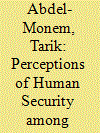

|
|
|
|
|
| Summary/Abstract |
Since 2004, close to 7,000 people have died in Thailand’s domestic insurgency in its three Muslim-majority southern provinces, one of the longest-running, low-intensity conflicts in Southeast Asia. This study assesses perceptions of human security threats in the area among a sample of students, their parents, and teachers of Islamic private schools (n = 427, n = 331, n = 51, respectively), and how they relate to perceptions of government actors and other community institutions. Questionnaire items were drawn from the World Values Survey Wave 6. Focus groups and interviews were also conducted to deepen our understanding of conflict related dynamics.
|
|
|
|
|
|
|
|
|
|
|
|
|
|
|
|
| 19 |
ID:
107861
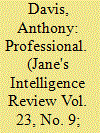

|
|
|
| 20 |
ID:
165075
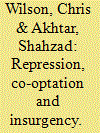

|
|
|
|
|
| Summary/Abstract |
Scholars have long identified state repression as playing a key role in the onset of insurgency. Violence by security forces increases anger against the state and assists with rebel recruitment. Yet scholars have also recognised that repression does not always lead to rebellion: in some cases it successfully quashes movements before they have begun. This study advances an argument for when and why repression leads to insurgency and sometimes does not. We contend that violence by state security forces can fail to trigger rebellion if local elites within the repressed community are simultaneously co-opted with political and economic opportunities. When elites are satisfied with local autonomy and patronage they deprive the dissident movement of local leadership and coordination. When the state uses repression against a community and at the same time abandons this mutually beneficial relationship, the insurgency has both the leadership and grassroots support it requires. We illustrate our argument by examining three cases of state violence in Asia. In two of our cases, Pakistan’s Federally Administered Tribal Areas (FATA) and Southern Thailand, repression led directly to insurgency. In the third, Papua in Indonesia, ongoing co-optation of local elites has left the movement factionalised and weak.
|
|
|
|
|
|
|
|
|
|
|
|
|
|
|
|
|
|
|
|
|